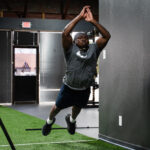The Role of Nutrition in Sports Performance Training
You can train hard, practice daily, and give your all in every session—but without proper nutrition, your progress will hit a wall. Sports performance training and nutrition go hand in hand.
Athletes need the right fuel to build muscle, recover faster, and perform at their best. Let’s explore the key role nutrition plays in maximizing sports performance and how you can create smart habits to level up your training results.
Why Nutrition Matters for Athletes
Think of your body like a high-performance machine. Without the right fuel, it won’t run smoothly. For athletes, food isn’t just about energy—it’s about performance.
During sports performance training, your body is:
-
Building and repairing muscle
-
Replenishing energy stores
-
Managing hydration and electrolytes
-
Supporting immune health
If you skip proper nutrition, you risk fatigue, slower recovery, and even injury.
Fueling your body right helps you train harder and bounce back quicker.
Macronutrients: The Building Blocks of Performance
There are three main macronutrients athletes need: carbohydrates, protein, and fats. Each plays a vital role in sports performance training.
Carbohydrates
Carbs are your primary energy source. They fuel your workouts, especially high-intensity and endurance sessions.
Great sources include:
-
Oats
-
Brown rice
-
Quinoa
-
Fruits
-
Sweet potatoes
Carb timing is important. Eat them before training for energy and after to replenish glycogen stores.
Protein
Protein helps repair muscles after tough training sessions. It also supports muscle growth and strength gains.
Quality protein sources:
-
Chicken
-
Eggs
-
Greek yogurt
-
Fish
-
Plant-based options like lentils and tofu
Aim to eat protein throughout the day—not just after workouts.
Fats
Healthy fats keep your hormones balanced and provide long-term energy. Don’t fear fat—it’s essential.
Good fat sources:
-
Avocados
-
Nuts
-
Olive oil
-
Fatty fish like salmon
Balance is key. Each meal should include a mix of these macronutrients.
Hydration: The Hidden Key to Performance
Dehydration can wreck your performance. Even losing 2% of your body’s water can reduce strength, speed, and focus.
During sports performance training, athletes should:
-
Drink water consistently throughout the day
-
Use electrolyte drinks for intense or long sessions
-
Monitor sweat loss and replace fluids accordingly
Hydration also helps regulate body temperature and supports recovery.
To stay on track, drink at least half your body weight in ounces of water per day—and more during training days.
Pre-Workout Nutrition Tips
What you eat before sports performance training can make or break your session.
Ideal pre-workout meals should include:
-
A moderate amount of carbs
-
A small amount of protein
-
Low fat and fiber to avoid stomach discomfort
Try eating 60–90 minutes before training. Good examples:
-
Whole grain toast with peanut butter and banana
-
Greek yogurt with berries
-
Chicken and sweet potato
If you’re short on time, a small snack 30 minutes before will still help.
Post-Workout Nutrition: Recovery Fuel
After training, your body needs to rebuild and refuel. A post-workout meal helps:
-
Replenish glycogen
-
Repair muscle fibers
-
Reduce soreness
-
Speed up recovery
Aim to eat within 30–60 minutes after your session.
Great recovery combos:
-
Protein shake with fruit
-
Grilled chicken and rice
-
Eggs with toast and avocado
According to Healthline’s sports nutrition guide, the ideal post-workout meal contains both carbs and protein in a 3:1 ratio.
Supplements: Do You Need Them?
Whole foods should always come first, but some athletes use supplements to support their training.
Popular options include:
-
Whey protein for muscle repair
-
Creatine for strength and power
-
Electrolytes for hydration
-
Omega-3s for joint and brain health
Before adding any supplement, talk to a coach or nutritionist. Quality and timing matter.
At Next Level Athletics, certified trainers help athletes choose the right fuel for their goals—no guesswork required.
Nutrition Tips for Game Day
Game day nutrition requires a little planning. You want to feel energized, not weighed down.
Here’s how to prepare:
-
Eat a balanced meal 2–3 hours before game time
-
Include carbs and protein (e.g., chicken sandwich with fruit)
-
Avoid new or heavy foods that could upset your stomach
-
Stay hydrated—drink water regularly in the hours before and during the game
Snacks like granola bars or a banana are great for halftime or quick energy.
Common Mistakes Athletes Make
Even with the best intentions, athletes sometimes fall into bad nutrition habits. Avoid these common mistakes:
-
Skipping meals
-
Overeating fast food
-
Not drinking enough water
-
Eating too little protein
-
Training on an empty stomach
If your energy crashes or you’re not recovering well, look at your plate. Fueling your body properly often makes all the difference.
Conclusion: Train Hard, Fuel Smart
You can’t out-train a poor diet. For athletes serious about performance, nutrition is just as important as the workouts themselves.
Whether you’re training for speed, strength, or endurance, the right fuel will help you push harder, recover faster, and compete better.
Make food part of your game plan—and watch your results soar.


Recent Comments